Seventh Hell, su nueva y esperada producción discográfica, representa su regreso a la escena progresiva, pero lo hacen de forma maravillosa y más experimental. Como siempre, la técnica con que la tecladista y principal compositora, Keiko Kumagai maneja su instrumento, no deja de sorprender, con un nivel de virtuosismo que no llega convertirse en exageración. Por otro lado se destaca también el trabajo de la guitarra, que a veces aporta cierto toque de metal enérgico al álbum, y esto es un elemento nuevo en la banda. El trabajo vocal se vuelve más importante en éste que en otros discos, y se hace notar sobre todo en el último y más largo tema, que tiene un acercamiento directo al rock ópera. El conjunto de éstos elementos novedosos en su música, combinados con las composiciones complejas y a la vez melódicas a las que nos tienen acostumbrados, hacen de Seventh Hell uno de los mejores álbums del 2009 y de la discografía de ésta banda japonesa.
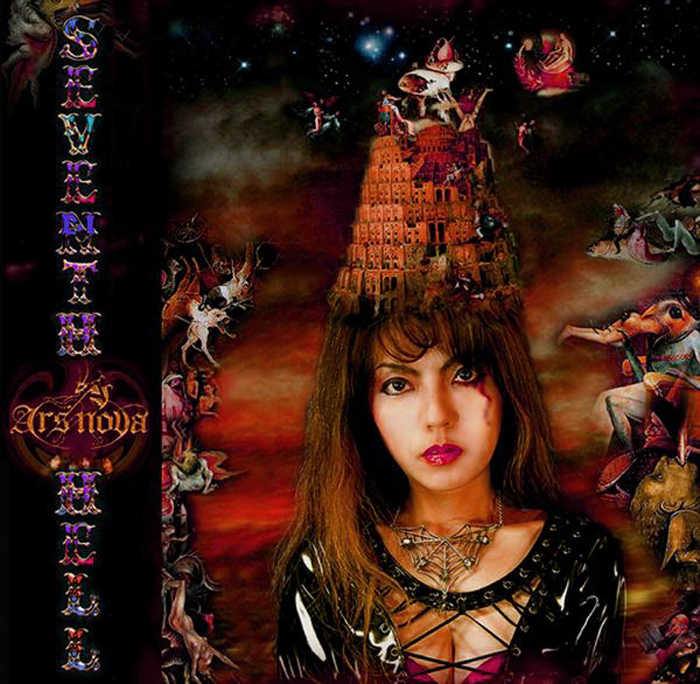
Seventh Hell, Ars Nova's latest, is based on 5 surrealist paintings - quite a unique concept. Led as ever by composer / keyboardist Keiko Kumagai, Ars Nova is currently a quartet with guitarist Satoshi Handa, drummer Hazime, and bassist Panky joining Kumagai. Special guests include Zoltan Fabian from Age Of Nemesis, bassists Ken Ishita and Kira, and vocalists Robby Valentine, Mika, and Daniela Lojarro. Let's go to Seventh Hell track by track...
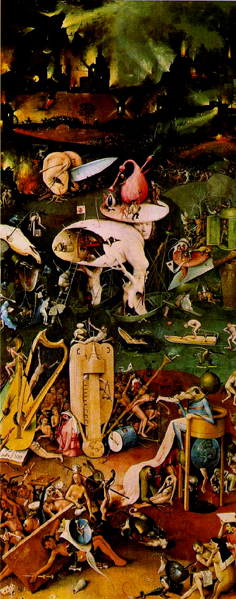
Track 1: Seventh Hell
KK: I like that picture, The Garden Of Earthly Delights - Hell by Hieronymus Bosch most, that portrays hell. I see the horrible sights from that, but the other hand, there are various unique demons and monsters in the picture that are funny and 'lovely' to me. (haha :-)) Each of them and the whole hell sight carefully painted made my imagination excited.
Anyway, I would like to make the song the most aggressive one and the main song on the album. To make it so, I thought the song needed one more aggressive and powerful guitarist, not only Satoshi. That guitarist is Zoltan Fabian from Age Of Nemesis (from Magna Carta Records) who played very well on the Succubus and The 42 Gods bonus tracks on Ars Nova's digitally re-mastered CDs. So, I thought he understood my music well and he was the right guitarist for the song. Just as I thought, he liked that picture as well that I chose for the song, so he understood and agreed with my intention for the song. Satoshi only recorded his (the first) solo on the song. Satoshi is rather better as a fusion-metal guitar player than metal. So all the guitars were arranged and played by Zoltan Fabian except the first guitar solo by Satoshi. I left all the guitars to Zoltan after the demo. Then he understood my intention and the song well and he made various guitar sounds and played with his own unique ideas. It was greater than I expected.
At the mixing of the song, I asked him to mix it with not too much keyboards. I wanted the keyboards and the guitars have the same balance. I also wanted to put different 2 guitar solos by Zoltan and Satoshi. First I put the backing riffs on their solo parts by Hammond. Then I asked them, please play your own best aggressive solo whatever you want. And their solos were both great and I was satisfied with them. But I did not want to make the whole song aggressive only. There is always 'classical music taste' in my mind. So I wrote that part after the aggressive part with 2 guitar solos, to put a 'wide gap'. The classical part starts with acoustic guitar, bells, the woodwinds and harp to remind criminals that all people desire peace and how much they had disturbed that, in my story. And I was sure that if some voices would be put as demons ones in a different language, it should be interesting. In the recording they are Latin, French, Finnish and Hungarian. Anyway, I am sure Seventh Hell is the right song as an opener.
ZF: Very dark themes, but they are also monumental at the same time. When I got the keyboard tracks, I was excited coz I couldn't imagine how the song would be in the end. I was sure about one thing only: Seventh Hell will be very good..After I woke up from the first shock of the difficult themes and the length of the song, I got the meaning of the concept. Then it was easy to play. I tried to make the aggressive parts more aggressive, with some special guitar tricks, tunings and so on. Also, the 'crazy' parts became more 'crazy' because of some crazy effects and some crazy tricks and techniques. :) I used some exotic scales. I played some special Hungarian-like themes coz they are good and maybe unusual in this genre. And after all I'm Hungarian. haha! Also, I recorded two different guitar solos. One for the Japanese and one other for the French releases. I thought I could fit myself and my playing with the song well. I was afraid of the new style a little bit coz that is more 'metal' than Ars Nova's previous style. But after that Keiko and Shingo liked the results, and I was happy. I'm proud of this song and it is a great honor to play with Ars Nova. :)
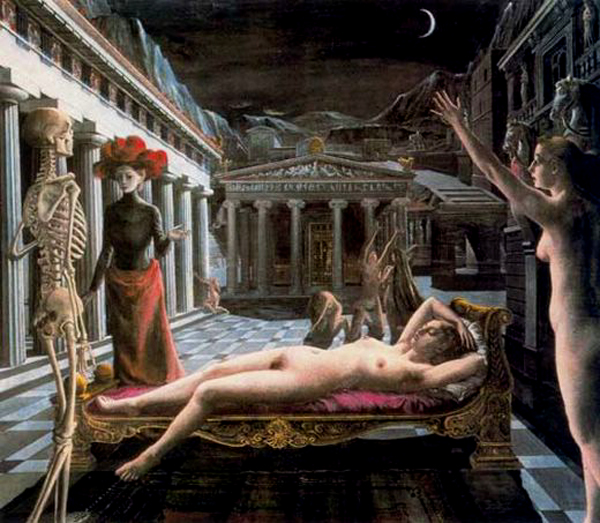
Track 2: La Venus Endormie
KK: I wanted to make the song beautiful and sad from the picture La Venus Endormie. The title means "Sleeping Venus." They say Venus dreams beautiful and peaceful dreams. But from the picture, I think it is a not so happy dream. In my imagination, she deplores the corruption of humanity in her dream. I see death, luxury, a cry, pain, and salvation from my point of view of the picture. In my own story, Venus would like to escape from that sad dream. So she dreams one other dream that is given by someone who loves her for healing her sadness. Only she is healed by that peaceful and beautiful dream and does not want to wake up forever..This is my own story from the picture. Basically I would like to make the song beautiful and sad, incorporating some acoustic and folk-like parts. Usually my Hammond sound is distorted but I did not use distorted Hammond on my solo. All Zoltan’s guitars and also the drums/percussion programming by him expressed my story of Venus well, and his work on both songs was great. You can listen to his beautiful and impressive acoustic guitar solo that sets off the song.
ZF: Beautiful and sad (or happy at the end of the song ) melodies that only Keiko can write. I only tried to help them with some acoustic guitars and solos. This song is more melodic than Seventh Hell and it was easier to play its themes on guitar. But only easier, not easy. haha :) For example: when all the distorted guitars come in, I played the solo all with glass notes bending them by the arm. I recorded that solo many many times till it was good enough. haha. I also added many acoustic guitars to this song so the song can be hard and pleasant at the same time. Anyway, it was a huge experience for me from the start till the end and I like this song very much. The mixing of Seventh Hell and La Venus Endormie was not easy at all..These songs have about a hundred tracks each. I sent the mixes to Japan and they wrote me their impressions, then I mixed the songs again and again until they said, it is OK. I'd like to say thanks for this chance to Ars Nova, it was great to work with you!
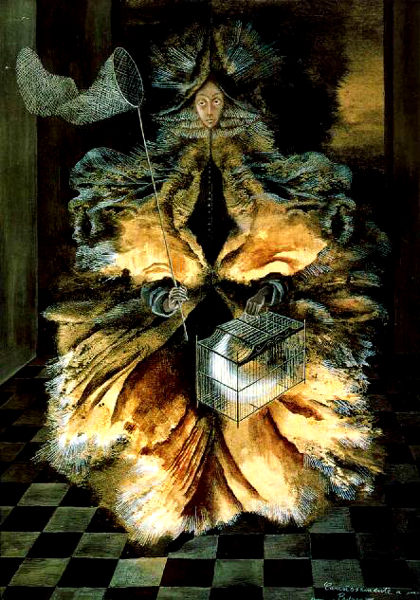
Track 3: Cazadora De Astros
KK: Remedios Varo is my most favorite female surrealist painter from Spain. I think this song is easier to understand than other my songs. I also wrote a Spanish part and a symphonic part on the song. The highlight part is from 4'12" to 6'13". Satoshi's guitars and my keyboards have fused remarkably on the song. This song already has a good reputation from listeners. I don’t know why they like the song much, but I am honored.
SH: I tried to put fusion and crossover sounds that Ars Nova songs never had before. I made the sound old age (70s) ones, so I think I was able to express a wealth of emotions. In proportion to progress, the guitar sound is getting harder and harder. I think I was able to create different aggressive guitars from Zoltan’s ones (Seventh Hell and La Venus Endormie).
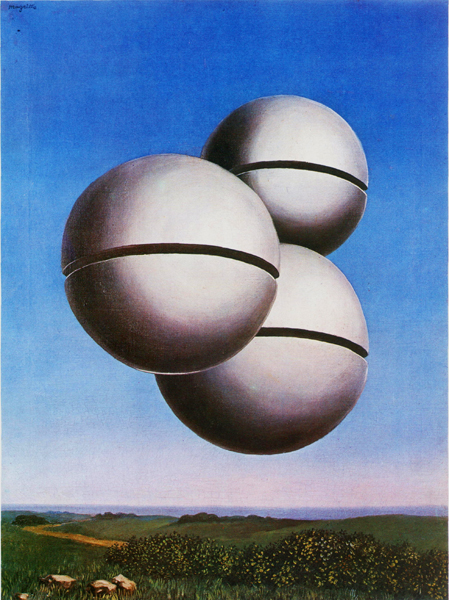
Track 4: Voice Of Wind
KK: On this album I adopted this song, which was written by another member of the band for the first time. This song is written by Hazime and I only read aloud the words that were written by him at the beginning, and recorded my crying and reverse reading on the middle part of the song. Therefore I did not take part in the song musically at all, I think it is good that the new album has 'new air'. You can enjoy his song that was composed mathematically and smartly.
H: I have chosen La Voix Des Vents by Rene Magritte for the song. From the picture, ‘symmetry’ as the concept came into my mind. So I expressed that with rhythm and composition in the song. For example, on the middle part of the riffs, I composed 13/8 beats. That composition is subdivided into 8/5 - 8/8. Also I arranged the progression of the song using those riffs with symmetry of the time axis.The picture that I chose is also a surrealist one, so I thought I needed to incorporate ‘actuality’ into the theme. Usually I express the meaning of positive and negative when I write song, so I did it the same way on the song. First I broke the image of the song to the listener with my method – to put major, minor and whole tone scales together alternately and add 17/8 beats. Then the tonality gives the listener an uncertainty. And another method is to use poly-tonality. It deletes the boundaries between major and minor scales. I emphasized the abstract that the picture has.The beginning of the prose that Keiko recites is also a link to the contents as stated above. The beginning of the prose is as below:
Dozing in the amber liquid
Central nerves follow the daydream
Uncivilized era becomes more invisible
As if the entropy of karma is going to expand
Then it reads a mean dimension
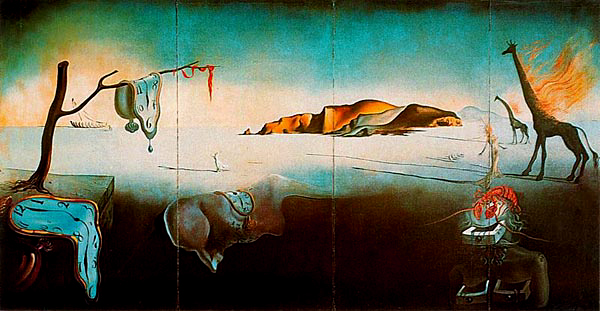
Track 5: Salvador Syndrome
KK: I was not be able to choose one picture only from many of Dali's paintings. Because there are many pictures that I love. So I put my impressions from his fantastic works and strange character on the whole song. So the length of the song was the longest. It was not easy to choose one picture only from many of Dali's paintings. Because there are many pictures that I love. But at least I chose The Dream Of Venus. Also I tried to put my impressions of his various fantastic works and strange character on the whole song. The length of the song was the longest one I have ever written. But I am sure it is the best song of all my songs. I put a four-handed performance on the piano on the left and right side of the recording on the first theme after Robby sings.
The first symphonic theme is my impression of whole the picture of The Dream Of Venus. After the symphonic part is the dark and heavier part. On that, I put my impression from Dali’s agony and fear of death from his boyhood. I like that part very much. Thinking that Dali is Spanish, I had Daniela sing in Spanish and I arranged and incorporated a Spanish part into the song. It was my first try. With Satoshi's guitars, Kira’s bass and piano programming and some advice from sound producer Shingo Ueno, I made it better.
Also I put the theme that Dali had been seeking and asking for heaven in his life. It was difficult for him to find the answer. On that theme, Robby Valentine’s wonderful vocals and Daniela Lojarro’s operatic vocals are so impressive and great, and they set off the song all the more. I played my synth solo from 5’48” for the French release. In the end I would really like to thank all the guests for the album, and I am sure Seventh Hell is the best of all Ars Nova’s albums.
SH: On this song I used heavy riffs on a 7 string guitar, Spanish part by gut guitar, acoustic stroke, clean tone harmonics, phased electric sitar, etc. To me it was the first time using so many guitar tracks and tones on one song! It was a great experience to me. The song is long enough, but it doesn’t get boring with the various parts. I think I was able to add both power and passion with my best effort.
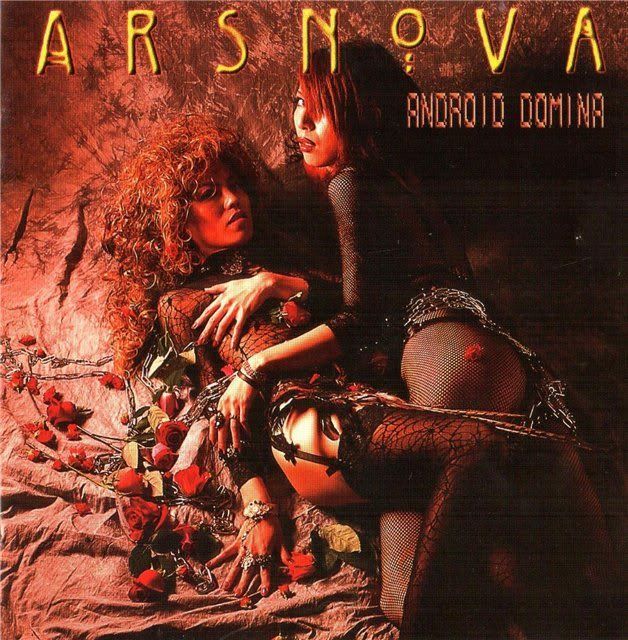
FUENTES:
http://squizophrenic.blogspot.com/2009/08/ars-nova-seventh-hell-2009.html
http://progsheet1.hypermart.net/ansh.html
http://nnm.ru/search?q=Ars%20Nova&in=tags
No hay comentarios:
Publicar un comentario